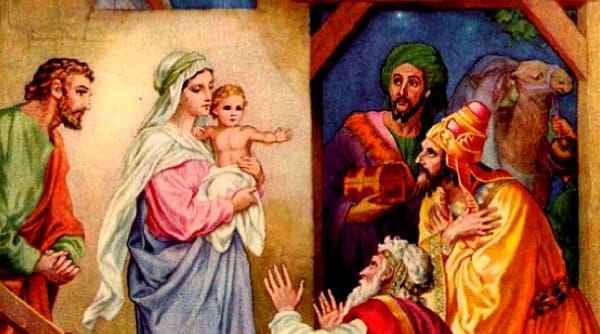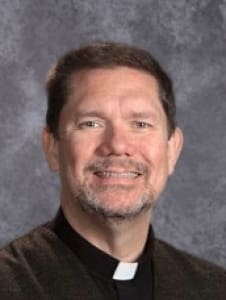As a child, I obsessively needed a nightlight, so afraid was I of the dark. My brother and I, who shared a bedroom, would often argue over that nightlight. They claimed not to be able to sleep with it on. I was convinced I couldn’t sleep with it off. Of course, we were all wrong. What was it about that light that so comforted me? What was it about a tiny light, twinkling like a star in the midst of a darkened night that still gives me comfort as an adult?
Matthew tells us in his Gospel that Magi from the east saw the star at its rising. They followed it to Jerusalem, where they went to Herod, asking to see the newborn king of the Jews. But Herod knew nothing of this king. He knew nothing of this star. And the news the Magi brought of a newborn king filled him not with the same joy with which they sought the child but with murderous rage. Herod knew nothing of this star because he was blind to its light. He was unable to recognize the light which this newborn king would bring to the world. Rather, he could see only the darkness of his own desires and the fear that this king would be his undoing. He was blind to the star because he was blind to the power of God’s love. He lived his life guided not by light and love but by his desire for power. He lived his life guided by darkness and fear.
In the feast of Epiphany, we celebrate the revelation of God’s light to the nations. In doing so, we celebrate our belief that salvation is not meant for a mere chosen few but for the whole world. God’s light is revealed to all who are eager to open their eyes to see that light for what it is. God’s love is revealed to all who are willing to open their hearts by a star shining in the darkened sky. God’s power is revealed in the person of a tiny, defenseless infant, whom Herod and the other rulers of this world would seek to destroy. God’s mercy is revealed the act of total, self-giving love, in which all is given and nothing is asked in return. And that mercy is still revealed to us today every time we give of ourselves for others—every time we show mercy to those around us—every time we lift the cross for those who are unable to carry the cross on their own—every time we are willing to see in another person the presence of the living God.
But in celebrating Epiphany—in celebrating God’s manifestation to the nations, we are not celebrating a light that has come and gone, like a flash in the night. We are not looking back with nostalgia to a better day that can never return. When our first reading on Christmas Eve told us that a people who walked in darkness have seen a great light, it wasn’t just referring to a people who lived two or three thousand years ago. We are that people who walked in darkness. At times, we are blinded, like Herod, by our disordered desires for power, pleasure, or prestige. We are people who at times give in to rage because we have forgotten who we are and who God has created us to be.
And yet, despite of all that blinds us, our eyes have been opened. Our eyes have been opened by God’s grace, which allows us to see, which allows us to believe. We are that people who have seen a great light, upon whom the glory of the Lord shines even today. We are that people to whom Christ manifests himself, revealing his love to us in unexpected ways. We are that people who are called to search not the darkened skies but our hearts for a sign of God’s love revealed to the nations—of God’s love revealed to us—that God is still alive and active in our world, giving of himself to us, emptying himself of everything so that we might be filled.
If we can see God’s light revealed in the symbol of a star in the sky, set to guide us and lead us to salvation, then we can certainly see God’s light revealed even in a world darkened by sin and suffering, by poverty, by cynicism, by sickness. If we can see God’s power revealed in a defenseless infant born into the poverty of a stable, then we can certainly recognize God’s power revealed in our weakness, in our sorrow, in our suffering. If we can believe that God emptied himself two thousand years ago to be born into the world as one of us, then we must believe that God continues to reveal himself even today. We see God’s image in the face of friend and stranger. We see God’s hand in acts of kindness, in selfless acts of love. We recognize God’s abiding presence in ourselves—in you and in me and in every human being—in every person who, through the waters of baptism, is called to bear Christ’s image to the world and to share his love by giving of themselves, by allowing themselves to be poured out so that there will be no more hunger, no more poverty, no more war, no more hatred, so that the kingdom of God can be established not in some mythological time gone by or some dreamed of day in the future, but today—in our world—in our very midst.
You and I—we must reflect the light of Christ shining on a darkened world to give hope to those who are hopeless. We must reflect the light of Christ shining on a world that is cynical, to be a sign of love to those who have never known love. We must rise up in splendor, to give witness to the great light which has overwhelmed the darkness of our world and shows us the glory of a God who loves us so much that he became one of us, in order that we might even one breath at a time, one heartbeat at a time, become ever more and more like him, in order that we might no longer be afraid.
Image credit: Heinrich Hofmann, Public domain, via Wikimedia Commons.




